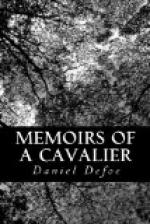One time in particular he had a design upon Aylesbury, the capital of Buckinghamshire; indeed our view at first was rather to beat the enemy out of town and demolish their works, and perhaps raise some contributions on the rich country round it, than to garrison the place, and keep it; for we wanted no more garrisons, being masters of the field.
The prince had 2500 horse with him in this expedition, but no foot; the town had some foot raised in the country by Mr Hampden, and two regiments of country militia, whom we made light of, but we found they stood to their tackle better than well enough. We came very early to the town, and thought they had no notice of us; but some false brother had given them the alarm, and we found them all in arms, the hedges without the town lined with musketeers, on that side in particular where they expected us, and two regiments of foot drawn up in view to support them, with some horse in the rear of all.
The prince, willing, however, to do something, caused some of his horse to alight, and serve as dragoons; and having broken a way into the enclosures, the horse beat the foot from behind the hedges, while the rest who were alighted charged them in the lane which leads to the town. Here they had cast up some works, and fired from their lines very regularly, considering them as militia only, the governor encouraging them by his example; so that finding without some foot there would be no good to be done, we gave it over, and drew off; and so Aylesbury escaped a scouring for that time.
I cannot deny but these flying parties of horse committed great spoil among the country people; and sometimes the prince gave a liberty to some cruelties which were not at all for the king’s interest; because it being still upon our own country, and the king’s own subjects, whom in all his declarations he protested to be careful of, it seemed to contradict all those protestations and declarations, and served to aggravate and exasperate the common people; and the king’s enemies made all the advantages of it that was possible, by crying out of twice as many extravagancies as were committed.
Tis true, the king, who naturally abhorred such things, could not restrain his men, no, nor his generals, so absolutely as he would have done. The war, on his side, was very much a la volunteer; many gentlemen served him at their own charge, and some paid whole regiments themselves: sometimes also the king’s affairs were straiter than ordinary, and his men were not very well paid, and this obliged him to wink at their excursions upon the country, though he did not approve of them. And yet I must own, that in those parts of England where the war was hottest, there never was seen that ruin and depopulation, murders, and barbarities, which I have seen even among Protestant armies abroad, in Germany and other foreign parts of the world. And if the Parliament people had seen those things abroad, as I had, they would not have complained.




